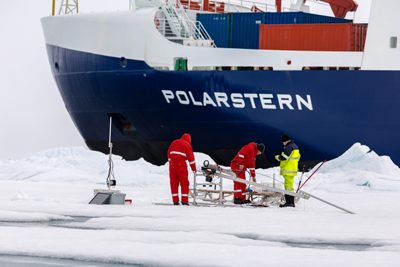

Installation of under-ice sensors during an ice station.
Photo: Alfred-Wegener-Institut / Stefan Hendricks
RV Polarstern will enter the sea-ice zone north of Spitsbergen. Covering two shallow regions on their way to deeper waters, the scientists on board will focus on the processes at work in the ice-covered central Arctic Ocean.
Their findings will then be used to supplement the research efforts of late-summer expeditions from the past several years. The researchers will for the first time employ several instruments that constantly measure the seawater’s temperature, salinity, gas composition and algae content.
“We want to determine which animals and plants in the Artic Ocean are active during the early summer. This is especially exciting this year, since it marks the first time in the past 30 years that the sea ice has begun melting so early,” explains AWI biologist Ilka Peeken.
Over the past few years, the AWI researchers have narrowed their focus on life under the sea ice and at the marginal zone between ice and open water. Global warming is especially making its presence felt in the Arctic, as reflected in the record low figures on the sea-ice extent.
At the same time, the ice is growing thinner and thinner, affecting the underwater light conditions. When more sunlight penetrates the ice, it means that algae, which make up the very beginning of the food web, have more energy for growth – just like their “cousin” plants on land, algae in the ocean need nutrients to grow.
“Our goal is to explore how the earlier melting of sea ice in the Arctic influences the distribution of nutrients and algae growth, and in turn what the impacts are for animals living in the water or on the ocean floor,” says Peeken. The scientists hope their efforts will improve awareness and understanding of climate change’s effects in the Arctic Ocean.
The Polarstern expedition, dubbed TRANSSIZ (Transitions in the Arctic Seasonal Sea Ice Zone), was initiated by the ART (Arctic in Rapid Transition) network – an international research team whose work combines various disciplines in the natural sciences to assess the consequences of climate change in the Arctic.
The vessel is scheduled to call at the port of Longyearbyen, Spitsbergen on 28 June before embarking on the next expedition, which will take the icebreaker to the Greenland Sea.
Notes for Editors: Printable images are available at http://www.awi.de/en/news/press_releases/. Your contact partner is Dr Folke Mehrtens (tel.: ++49 471 4831-2007; e-mail: medien(at)awi.de) from the Department of Communications and Media Relations.
Follow the Alfred Wegener Institute on Twitter and Facebook. In this way you will receive all current news as well as information on brief everyday stories about life at the institute.
The Alfred Wegener Institute conducts research in the Arctic, Antarctic and oceans of the high and mid-latitudes. It coordinates polar research in Germany and provides major infrastructure to the international scientific community, such as the research icebreaker Polarstern and stations in the Arctic and Antarctica. The Alfred Wegener Institute is one of the 18 research centres of the Helmholtz Association, the largest scientific organisation in Germany.











